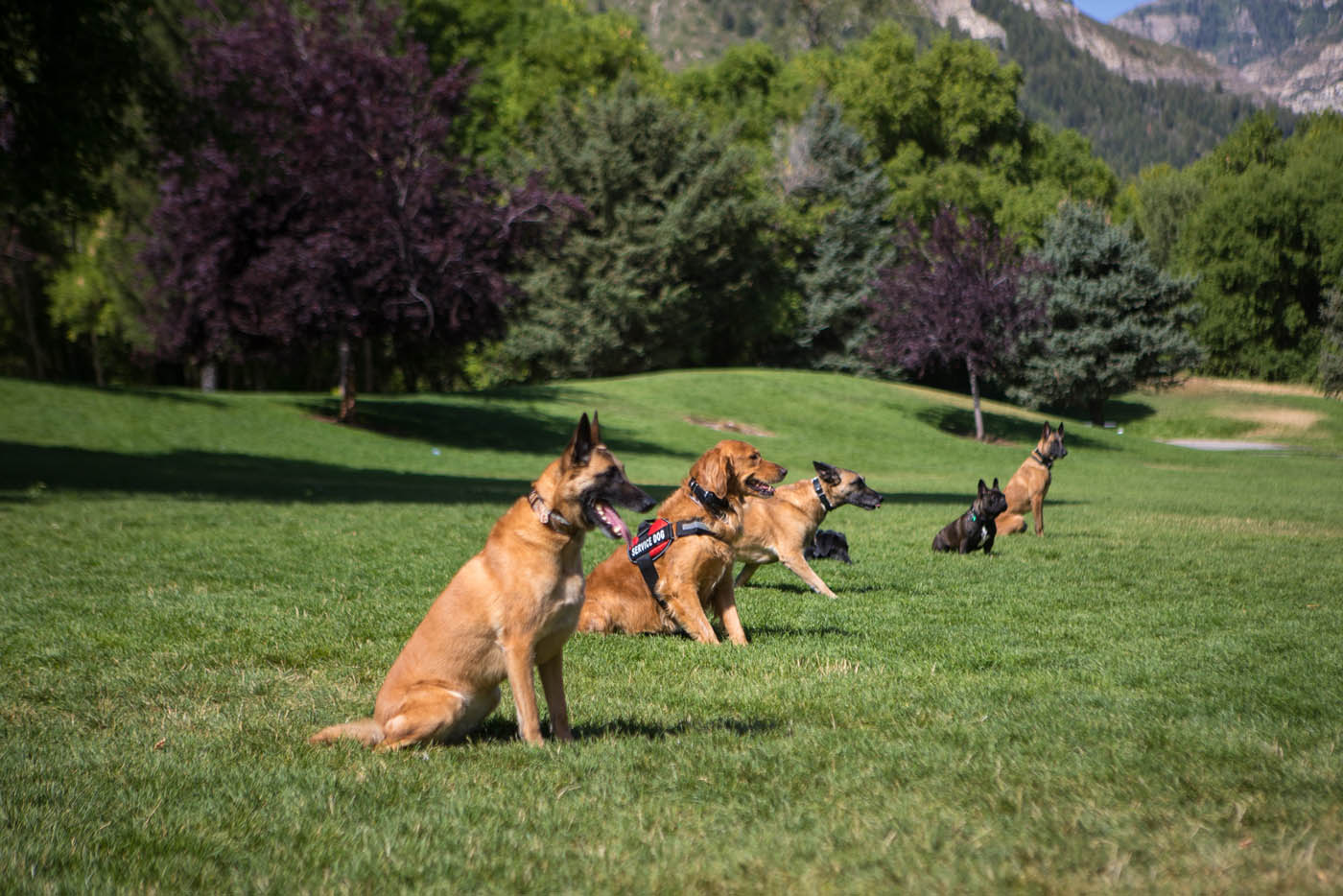Dog Training Near Me: How to Track Your Pet’s Progress Effectively
Reliable Methods for Effective Pet Training: A Comprehensive Guide
Efficient dog training calls for a nuanced understanding of canine actions. It rests on the principles of positive support and uniformity. Trainers need to recognize the value of crucial commands and socialization. Addressing usual behavioral issues can transform a pet's personality. As the bond in between owner and dog enhances, the method they interact advances. The trip of effective training includes various techniques that may stun also seasoned animal owners. What are the crucial elements that can make a considerable difference?
Comprehending Canine Actions
Understanding canine actions is crucial for effective dog training, as it enables instructors to analyze a pet dog's activities and reactions in numerous circumstances. Canines communicate mainly via body movement, articulations, and faces. Acknowledging indications of anxiety, hostility, or anxiety can help trainers change their strategies to guarantee a positive training experience. As an example, a wagging tail does not always indicate happiness; the context and various other body cues have to be taken into consideration.
In addition, comprehending a pet's breed-specific qualities can supply insights right into their behavior patterns and impulses. Socializing plays an important duty in forming a dog's feedbacks to new individuals and environments. Observing a pet's play style can additionally reveal their temperament and comfort degrees. By thoroughly evaluating these actions, fitness instructors can create customized techniques that promote learning and enhance the bond in between canine and proprietor, ultimately causing even more effective training end results.
The Significance of Positive Support
Favorable support is a vital method in canine training that improves the finding out procedure by satisfying desired actions. This method encourages dogs to repeat activities that yield positive outcomes, such as deals with, praise, or playtime (Dog Training Near Me). By linking etiquette with rewards, dogs end up being more inspired and engaged throughout training sessions

Including favorable reinforcement into training regimens can lead to quicker discovering and far better retention of commands. It advertises a joyous ambience that improves both the pet's experience and the instructor's satisfaction, making it a basic facet of effective pet training.
Vital Commands Every Canine Ought To Know

Creating a Constant Training Arrange
Developing a regular training schedule is crucial for efficient pet dog training, as it assists reinforce discovering and creates a feeling of routine for the pet dog. An organized approach enables both the fitness instructor and the pet dog to anticipate training sessions, which can boost focus and interaction. Ideally, training sessions must be short, lasting between 5 to 15 minutes, to keep the dog's focus and enthusiasm.
Including training right into day-to-day tasks, such as mealtime or strolls, can also advertise uniformity. This assimilation assists pets link training with favorable experiences. It is crucial for instructors to continue to be versatile; unanticipated events might necessitate adjustments to the routine.
Additionally, repetition is essential. Routine method of commands and habits solidifies knowing and builds self-confidence. By sticking to a regular routine, instructors can guarantee that their pets establish excellent routines and respond reliably to commands, laying the foundation for reliable training outcomes.
Socializing: Key to a Well-Adjusted Pet dog
Socialization is vital for a canine's development, influencing their behavior and communications with individuals and various other animals. Very early direct exposure to numerous environments, sounds, and experiences can significantly improve a dog's flexibility and confidence. Employing reliable socializing strategies can aid ensure a well-adjusted canine friend.
Value of Early Socialization

Strategies for Reliable Socialization
While many dog proprietors identify the importance of socializing, comprehending efficient strategies to promote this process is vital for fostering a well-adjusted animal. Progressive exposure to varied atmospheres, people, and various other pets can greatly boost a dog's convenience degree in different circumstances. Favorable reinforcement plays an essential function; fulfilling preferred actions urges pet dogs to approach new experiences with self-confidence. Structured playdates with genteel pets assist alleviate and develop social abilities fear reactions. Enlisting in obedience classes can additionally provide regulated environments for socialization. Maintaining a tranquil demeanor as a proprietor enhances the pet dog's sense of security, enabling for even more effective interactions. These methods collectively add to a balanced and adaptable canine companion.
Taking Care Of Typical Behavioral Issues
Dealing with common behavioral issues is essential for keeping a harmonious relationship in between dogs and their owners. Trick difficulties such as hostility, extreme barking, and leaping habits need targeted strategies to manage efficiently. Comprehending the source of these habits can lead to successful interventions and an extra balanced canine buddy.
Addressing Aggressiveness Issues
Aggression in pet dogs can manifest in numerous types, posing difficulties for proprietors and instructors alike. Attending to these issues requires a detailed understanding of the underlying causes, which might consist of anxiety, territoriality, or resource protecting. Identifying triggers is important; owners should observe discover this their pet's body language and actions to pinpoint specific situations that prompt hostility. Positive reinforcement techniques can properly modify aggressive habits, fulfilling tranquil feedbacks to identified triggers. Consistency is vital, and owners have to continue to be client throughout the training procedure. Sometimes, specialist support from a qualified pet trainer or behaviorist might be needed, particularly for serious hostility. Ultimately, the objective is to develop a secure atmosphere for both the pet dog and those around it.
Handling Too Much Barking
Excessive barking can be a substantial annoyance for dog owners and neighbors alike, frequently signaling underlying problems that need addressing. Recognizing the triggers behind the barking is essential; these may consist of dullness, anxiety, or a response to outside stimulations. Proprietors ought to observe their pet's behavior and environment to identify the reason. Dog Training Near Me. Implementing consistent training strategies, such as positive reinforcement, can successfully minimize barking. Educating commands like "quiet" or redirecting the pet dog's attention right now of barking can be beneficial. Additionally, supplying appropriate physical and psychological excitement via workouts and interactive playthings can alleviate boredom-related barking. In some instances, seeking advice from an expert fitness instructor or behaviorist might be needed to develop customized methods that deal with relentless barking issues
Reducing Jumping Actions
Many dogs exhibit leaping behavior, usually as a way of expressing enjoyment or seeking focus from their visitors and owners. This actions can be problematic, particularly when it results in unintentional injuries or pain for guests. To lower leaping, owners should initially remain calm and prevent awarding the habits with attention, as this can enhance it. Rather, they can show an alternative actions, such as sitting, by compensating the dog for continuing to be calmness when someone methods. Uniformity is vital; all member of the family must implement the exact same regulations. Furthermore, training sessions must include interruptions to assist the pet dog learn to control their impulses. In time, with persistence and persistence, leaping can be considerably decreased, resulting in an extra pleasurable atmosphere.
Constructing a Solid Bond With Training
Educating a pet often focuses on actions and commands, it additionally offers as a crucial chance to enhance the bond between the pet and its proprietor. Participating in training sessions fosters interaction, mutual understanding, and trust. When proprietors spend time in instructing their pet dogs, they demonstrate dedication, which assists the dog feel safe and valued. Positive reinforcement methods, such as deals with and praise, not just encourage wanted habits yet also strengthen the psychological link between the dog and proprietor.
Consistency in training constructs a sense of dependability, enabling canines to comprehend their role within the home. Each successful command increases the dog's self-confidence, resulting in a deeper partnership. Normal training sessions can end up being satisfying bonding experiences, filled up i loved this with playfulness and communication - Dog Training Near Me. Ultimately, the procedure of training transcends simple obedience, developing a partnership that enhances the lives of both the dog and its proprietor
Regularly Asked Concerns
What Age Is Best to Begin Educating a Puppy?
The most effective age to begin training a pup is normally in between 8 to 12 weeks. At this stage, young puppies are most responsive to finding out, making it a suitable time for fundamental training and socializing.
Exactly how Lengthy Should Each Training Session Last?
The ideal period for every canine training session commonly ranges from 5 to 15 minutes, relying on the dog's age and interest period. Short, concentrated sessions improve finding out and retention, making training more reliable and satisfying.
Can Older Pet Dogs Still Be Trained Successfully?
Older pet dogs can without a doubt be educated successfully. With persistence and regular methods, they can discover brand-new commands and actions. Their experience often makes them extra responsive to training, improving the bond between dog and owner.
What Equipment Do I Need for Educating?
For efficient canine training, essential equipment includes a tough leash, a comfy harness, high-value deals with, training clickers, and a range of toys. These devices facilitate communication and reinforce positive actions throughout training sessions.
Exactly how Do I Track My Dog's Training Development?
To track a pet's training progression, one can maintain a journal, document milestones, and note behavioral adjustments. Normal assessments, consisting of timed commands and obedience examinations, help evaluate improvement and recognize areas requiring additional focus.
Comprehending canine behavior is essential for efficient canine training, as it allows instructors to analyze a pet dog's actions and reactions in various circumstances. look at this now Developing a consistent training schedule is essential for reliable pet training, as it aids enhance understanding and produces a sense of routine for the pet dog. Educating a dog commonly focuses on habits and commands, it also serves as a necessary opportunity to enhance the bond in between the dog and its proprietor. When owners spend time in teaching their pets, they demonstrate commitment, which helps the pet feel safe and secure and valued. The excellent period for each dog training session generally varies from 5 to 15 minutes, depending on the canine's age and interest span.